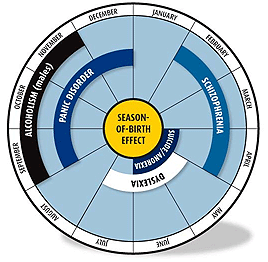
« PREVIOUS ENTRY
“Tractor-tire-sized calamari”

Does the time of year you’re born affect your mental state — and your potential for developing some form of mental illness? According to this interesting piece in the New Scientist, researchers are beginning to think so. The idea actually goes back all the way to 1929, when the Swiss scientist Moritz Tramer noted that people born in late winter were much more likely to develop schizophrenia later in life; indeed, that correlation has been verified in so many followup studies that one study argued “the increased risk of schizophrenia that comes with a winter birthday is almost twice the increase in risk linked to having a parent or sibling with the disorder.”
But assuming the connection is true, why would it occur? The obvious culprit is sunlight, the major time-of-year variable. Since sunlight affects levels of everything from melatonin to vitamin D and various neurotransmitters, these could be causing changes in a pregnant mother that have carryover effects on a fetus and its development.
Obviously, this is pretty subtle stuff, and still pretty conjectural. But one of the more fasinating hypotheses is that one’s likelihood of becoming anorexic could be linked to the time of year in which you’re born. Here’s a longish excerpt:
Beth Watkins, an eating disorder researcher at St George’s Hospital Medical School in London, has suggested a more subtle reason for the season-of-birth link to anorexia, which follows a similar pattern to that for suicide. Her idea is not that the seasons cause changes in the fetus, but rather that seasonal effects allow babies vulnerable to the condition to be conceived and born only at certain times of the year. People with anorexia are eight times as likely as the general population to have a parent or sibling with the disorder. Often that relative is the mother, and this got Watkins thinking. Was there something about overly thin mothers that might vary by season? “Their actual fertility is on a knife-edge,” she says, and babies born in the months most strongly linked to anorexia were conceived in July to September — which follow the northern hemisphere’s warmest months. Could the higher temperature allow an anorexic mother to conserve just enough energy to tip her into a fertile state?
Watkins and her colleague Kate Willoughby looked at a sample of nearly 400 women in the UK with anorexia and other eating disorders. In the UK, only in the summer months of July and August does the average monthly temperature tend to rise above 15 °C, and in keeping with Watkins’s hypothesis, significantly more people with anorexia had been conceived during these warmest months. They then collected data on 200 patients in Australia living in and around Sydney, where average temperatures drop below 15 °C only in the winter months of June, July and August. Sure enough, they found that fewer had been conceived in these cooler months. Finally, they looked at a sample of people with anorexia from Singapore, where the temperature remains constant at over 25 °C all year round. There they found no season-of-birth effect at all.
Intriguing stuff, to be sure. Also check out that chart above: It lets you calculate what sort of disorders are correlated to what parts of the year. Click on here for a larger version!
I'm Clive Thompson, the author of Smarter Than You Think: How Technology is Changing Our Minds for the Better (Penguin Press). You can order the book now at Amazon, Barnes and Noble, Powells, Indiebound, or through your local bookstore! I'm also a contributing writer for the New York Times Magazine and a columnist for Wired magazine. Email is here or ping me via the antiquated form of AOL IM (pomeranian99).

ECHO
Erik Weissengruber
Vespaboy
Terri Senft
Tom Igoe
El Rey Del Art
Morgan Noel
Maura Johnston
Cori Eckert
Heather Gold
Andrew Hearst
Chris Allbritton
Bret Dawson
Michele Tepper
Sharyn November
Gail Jaitin
Barnaby Marshall
Frankly, I'd Rather Not
The Shifted Librarian
Ryan Bigge
Nick Denton
Howard Sherman's Nuggets
Serial Deviant
Ellen McDermott
Jeff Liu
Marc Kelsey
Chris Shieh
Iron Monkey
Diversions
Rob Toole
Donut Rock City
Ross Judson
Idle Words
J-Walk Blog
The Antic Muse
Tribblescape
Little Things
Jeff Heer
Abstract Dynamics
Snark Market
Plastic Bag
Sensory Impact
Incoming Signals
MemeFirst
MemoryCard
Majikthise
Ludonauts
Boing Boing
Slashdot
Atrios
Smart Mobs
Plastic
Ludology.org
The Feature
Gizmodo
game girl
Mindjack
Techdirt Wireless News
Corante Gaming blog
Corante Social Software blog
ECHO
SciTech Daily
Arts and Letters Daily
Textually.org
BlogPulse
Robots.net
Alan Reiter's Wireless Data Weblog
Brad DeLong
Viral Marketing Blog
Gameblogs
Slashdot Games